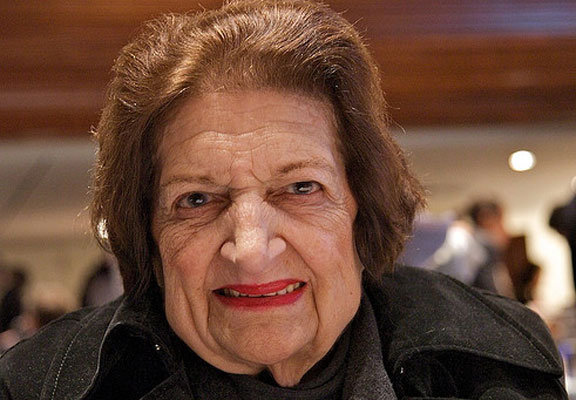

Credit: Michael Foley Photography on Flickr, under Creative Commons (CC BY-NC-ND 2.0).
(WOMENSENEWS)–Having a “front seat” to history was not just a cliché for Helen Thomas.
She literally sat in that front seat at presidential news conferences for decades.
I got to know the veteran newswoman who just died at age 92 when she visited the Scripps School of Journalism at Ohio University, where I teach, several times in the mid-1990s as a visiting professor.
She was in her mid-70s and still working full time. She would periodically visit and stay for a few days, talking to as many classes and student groups as possible. She would discuss with faculty and students her thoughts and experiences about world events, famous people she covered and the challenges and rewards of pursuing a career in journalism.
One of the most fascinating qualities about Thomas was that as the media world was transforming before our eyes, she gave the impression that she never had and never would change. And that’s exactly what made her so likable and successful.
Who else would continue working for UPI after that media outlet clearly had lost just about all of its earlier luster? Who else would shun the lure of a glamorous job in television to remain at a wire service?
By the time I met her, she had worked for UPI (or, earlier, United Press) for nearly four decades in what most would describe as a “heavy-lifting” job.
‘Print Person’ to the Core
She was constantly on the run, on the trail of world events early in her career, and, of course, chasing presidents for most of the rest of it. As far as I know, she never sought full-time jobs in television or the “new” media.” Tiny, with red hair and bright red lipstick, Thomas always dressed beautifully and looked well put together. But she was, as journalists used to call it, a “print person” to the core.
Thomas would go to lunch with the faculty when she visited, and we liked to think we were getting the real scoop; her personal opinions about the people and events she covered; information that we didn’t necessarily read about in her stories.
It was fascinating to listen to her mainly because she didn’t focus on herself. It was always details and her opinions about what she covered and she never acted as though she were bored answering what were probably the same questions over and over again.
What I truly admired about Thomas was her ability to make her job seem fascinating to a group of 19- and 20-year-olds.
Even then, many of the students viewed print journalism as the dinosaur of the media world. Thomas, down to earth and energetic as she was, made the job of a print reporter downright exciting. To her, stupid questions didn’t exist, even though, in truth, one or two would sneak in occasionally during those sessions with students. But she never let on if she thought a student asked a less than “informed” question about world events.
One Weak Spot
Thomas would not have survived in journalism as long as she did if she were not objective and unbiased. She covered 10 presidents, but from what I could tell, her weak spot was President John F. Kennedy. When it came to him, she did not seem so objective. She loved the man, and recollections of him made their way into just about every presentation or speech she gave; and this was more than 30 years after he was gone. Thomas may have never recovered from his death.
Most of Thomas’s charm and longevity stemmed from her candid and straightforward personality. In an era of television and the Internet, when people can, ironically, hide who they truly are, Helen was always Helen.
She loved what she did, and she loved the strange and quirky qualities of the people she covered.
Some of what she told us at those faculty lunches never made their way into stories. Her candor was refreshing, and almost unheard of by the late 1990s. This is why it was so sad that her career came to such a crashing halt when she made critical remarks to someone about Israel, unaware that the person was recording her.
That incident was unfortunate for several reasons: first, because Thomas evidently did not realize she was being recorded, and second, because Thomas frequently offered her personal opinions about people and events, but she kept her opinions out of her news reporting.
In a journalistic era of hyperbole and overstatement when “longevity” can be measured in terms of months instead of decades, Thomas was truly of another era.
Thank you, Ms. Thomas.
Marilyn Greenwald is a professor of journalism at the E.W. Scripps School of Journalism at Ohio University.
Would you like to Comment but not sure how? Visit our help page at https://womensenews.org/help-making-comments-womens-enews-stories.
Would you like to Send Along a Link of This Story? https://womensenews.org/story/journalist-the-month/130724/helen-thomas-leaves-her-front-seat-history


